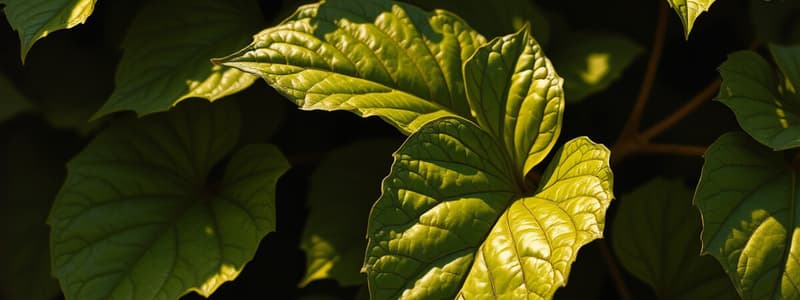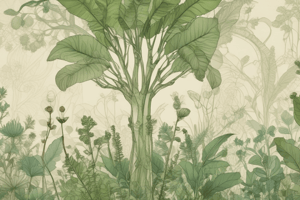Podcast
Questions and Answers
What is the main function of a leaf?
What is the main function of a leaf?
The main function of the leaf is to absorb light and carry out photosynthesis.
How are leaves protected from excessive loss of water?
How are leaves protected from excessive loss of water?
The waxy cuticle provides a waterproof barrier.
What would happen to a plant if its stomata stayed open all the time?
What would happen to a plant if its stomata stayed open all the time?
The plant would dehydrate.
Describe an environment where the leaves would have stomata that are closed most of the time.
Describe an environment where the leaves would have stomata that are closed most of the time.
In what part of the leaf does photosynthesis usually occur?
In what part of the leaf does photosynthesis usually occur?
How does the leaf get water for photosynthesis?
How does the leaf get water for photosynthesis?
How does the leaf get carbon dioxide for photosynthesis?
How does the leaf get carbon dioxide for photosynthesis?
What happens to the sugars after they are produced?
What happens to the sugars after they are produced?
What happens to the oxygen made during photosynthesis?
What happens to the oxygen made during photosynthesis?
What is a pitcher plant or Venus fly trap?
What is a pitcher plant or Venus fly trap?
What are rock plants?
What are rock plants?
What are pine needles?
What are pine needles?
What is broadleaf?
What is broadleaf?
What is a cactus?
What is a cactus?
Flashcards are hidden until you start studying
Study Notes
Main Functions of Leaves
- Absorb light and perform photosynthesis for food production.
Water Conservation
- Waxy cuticle acts as a waterproof barrier, protecting leaves from excessive water loss.
Stomata Function
- If stomata remained open continuously, the plant would experience dehydration.
Leaf Adaptations in Dry Environments
- In arid conditions, leaves typically have closed stomata to conserve water.
Site of Photosynthesis
- Photosynthesis predominantly occurs in the mesophyll, the ground tissue of the leaf.
Water Acquisition for Photosynthesis
- Roots absorb water, which is then transported to leaves via xylem.
Carbon Dioxide Source
- Carbon dioxide enters the leaf through the stomata, facilitating photosynthesis.
Sugars Post-Photosynthesis
- Produced sugars are transported throughout the plant via phloem, with some stored in roots.
Oxygen Release
- Oxygen generated during photosynthesis exits the leaf through stomata.
Unique Plant Adaptations
- Pitcher Plants/Venus Flytraps: Adapted to nutrient-poor environments, designed to trap organisms for nutrient absorption.
- Rock Plants: Feature round leaves with few stomata, clear surfaces for light penetration, suited for hot, dry conditions.
- Pine Needles: Possess a waxy epidermis and sunken stomata to conserve water; slender shape aids in water retention.
- Broadleaf Plants: Have broad, flat leaves to maximize sunlight collection.
- Cacti: Have non-photosynthetic thorns serving as leaves; their stems perform photosynthesis.
Studying That Suits You
Use AI to generate personalized quizzes and flashcards to suit your learning preferences.





